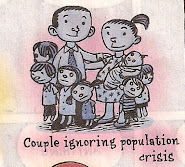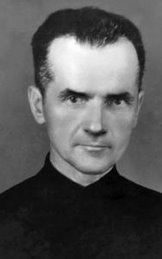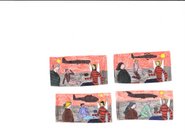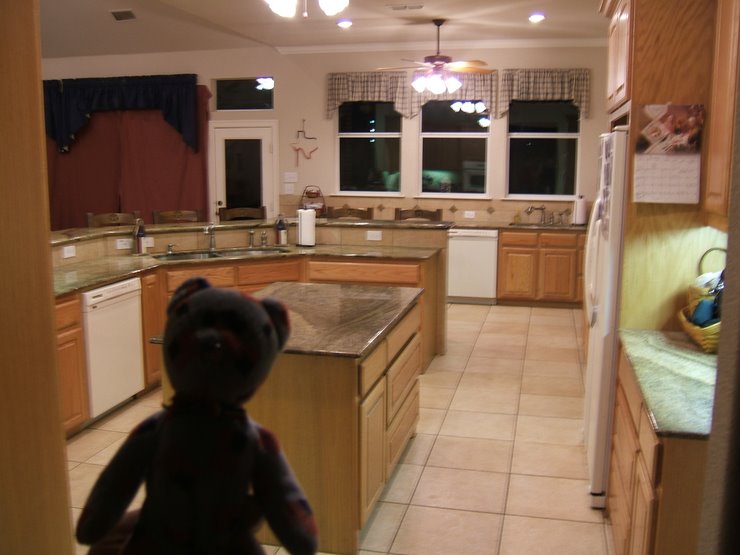 Here we see the lifeguard at the Inn of St. Catherine of Siena standing by a Statue of St. Catherine(Hanceville, Alabama, January, 2007)
Here we see the lifeguard at the Inn of St. Catherine of Siena standing by a Statue of St. Catherine(Hanceville, Alabama, January, 2007)Why you should read this book:
To Read Better, To Write Better.
Nothing just ‘happens’ to dadwithnoisykids. Shortly after reading Dr. Elizabeth Kantor’s book, The Politically Incorrect Guide to English and American Literature, I received my newsletter from my alma mater. In there I read about the recent death of an English professor whom I had for a freshman composition course back in 1982. May he rest in peace. His death, and reading Kantor’s book, got me to thinking about my own education. I went to a state school where the tuition was affordable and where the science program was strong. Granted, there were no Nobel laureates on the faculty, but the majority of the classes were taught by professors rather than graduate students. When comparing my education with those of friends who went to the Ivy League schools, I always joked that I was getting a degree at ‘bargain basement’ prices while they were paying an enormous amount to get the same thing. I also argued that my inexpensive degree prepared me well for life.
Now I am not so sure. I took one composition class, and a course in Shakespeare, and after that my greatest literary works were technical reports for various chemistry and physics laboratory assignments. Granted, the career track I selected has blessed me with the means to provide for my family – the highest purpose for an occupation is to finance the vocation one has chosen. It also has blessed me with a job that I really, REALLY enjoy:
“IwanttobeadoctorsoIcanusemyinterestinthesciencestohelppeople”
- Dadwithnoisykids, on multiple applications and interview for medical school
But in so many ways, I am still the socially awkward guy with very little to say and so ill-equipped to say it. My wife is far more interesting to talk to, and she didn’t spend nearly so much time in a classroom. And worst of all, whenever some quote or comment comes to mind as I go through my life, invariably it is from some television show or movie. This is from a man who got rid of the television from our house 12 years ago. May God forgive me for remembering so much garbage. If I quote poetry it is more often some line from some rock song, such as:
“Run, rabbit run.
To Read Better, To Write Better.
Nothing just ‘happens’ to dadwithnoisykids. Shortly after reading Dr. Elizabeth Kantor’s book, The Politically Incorrect Guide to English and American Literature, I received my newsletter from my alma mater. In there I read about the recent death of an English professor whom I had for a freshman composition course back in 1982. May he rest in peace. His death, and reading Kantor’s book, got me to thinking about my own education. I went to a state school where the tuition was affordable and where the science program was strong. Granted, there were no Nobel laureates on the faculty, but the majority of the classes were taught by professors rather than graduate students. When comparing my education with those of friends who went to the Ivy League schools, I always joked that I was getting a degree at ‘bargain basement’ prices while they were paying an enormous amount to get the same thing. I also argued that my inexpensive degree prepared me well for life.
Now I am not so sure. I took one composition class, and a course in Shakespeare, and after that my greatest literary works were technical reports for various chemistry and physics laboratory assignments. Granted, the career track I selected has blessed me with the means to provide for my family – the highest purpose for an occupation is to finance the vocation one has chosen. It also has blessed me with a job that I really, REALLY enjoy:
“IwanttobeadoctorsoIcanusemyinterestinthesciencestohelppeople”
- Dadwithnoisykids, on multiple applications and interview for medical school
But in so many ways, I am still the socially awkward guy with very little to say and so ill-equipped to say it. My wife is far more interesting to talk to, and she didn’t spend nearly so much time in a classroom. And worst of all, whenever some quote or comment comes to mind as I go through my life, invariably it is from some television show or movie. This is from a man who got rid of the television from our house 12 years ago. May God forgive me for remembering so much garbage. If I quote poetry it is more often some line from some rock song, such as:
“Run, rabbit run.
Dig that hole, forget the sun,
and when at last the work is done
don't sit down it's time to dig another one.”
(This is what I say whenever someone passes me on the freeway; they become the ‘rabbit’ which will flush out any police on the road ahead of me.)
So here I am, a forty-something man trying to fix what I see as a glaring deficiency in my development as a man striving to be a good example to his children and less boring to those around me. Reading, writing, blogging, and encouraging my children to do the same are all things that I have taken as ways to improve myself.
I read Dr. Kantor’s book to read better and to write better. I picked her book, partly because it was given to me at a time when I needed something to distract me, but also because of the label ‘politically incorrect.’ I live and breathe politically incorrectness, so the book had instant appeal to me. I also suspected that what she said in the Introduction is true: that English or American literature is one of the last things one will study in an English department. A central theme to this book is that reading English and American literature will teach one about our culture, and show how the writings of a century ago (or more) can be relevant in this day and age. The politically incorrect zinger is that most of the literature was written by white males, or ‘dead white males,’ as the cover boasts.
The book is divided into three parts.
The first, titled ‘What They Don’t Want You to Learn from English Literature,’ covers writings from Beowulf(in old English), Medieval Literature(Malory), the Renaissance(Shakespeare), the 17th Century(Milton), 18th Century(Pope, Swift), 19th Century(Coleridge) and the 20th Century. There is also a section on American Literature (Twain, O’Conner). This brief overview of literature piqued my curiosity and gave me some ideas on where to start reading first.
The second part of the book, ‘Why They Don’t Want You to Learn about English and American Literature,’ discusses some of the reasons for not teaching literature in English departments. While I am not in a position to validate Dr. Kantor’s thesis, I have to say that my recollections of the English department at my alma mater are similar to those in the book. Even my class in Shakespeare was filled with watching movies (King Lear, Romeo and Juliet) rather than reading more Shakespeare. Higher level English classes were on more strange topics and seemed to be pushing the liberal agenda.
This section also included a chapter on what literature is for; namely, to ‘teach and delight.’ This section adds another reason for studying literature to my rather simplistic statement at the beginning of this review. Here I quote Dr. Kantor:
“Once you begin to know really good literature, you’ll want to fill your mind with it. You’ll find yourself measuring the objects you pursue, the satisfactions you achieve, and the kind of person your actions are making you against the standards you find in our classic novels and plays. You’ll want to store poetry up for your old age, so you‘ll have something of real value to turn over in your mind in the nursing home: you’ll be able to close your eyes, put your head back during the perpetually running soap operas and quiz shows (or whatever fresh humiliation they’ve dreamed up for “seniors” by then), and see Shakespeare’s sonnets, or Jane Austen’s marvelous characters, instead.”
(Page 210)
I would rather spend my waning years recalling the good, true, and beautiful than rehashing episodes of Gilligan’s Island.
The third, ‘How You Can Teach Yourself English and American Literature – Because Nobody Is Going to Do It for You,’ gives practical suggestions for a life-long study of literature. One of the best suggestions is to follow what Dr. Kantor calls Reed’s Rule, (after a professor at Chapel Hill, NC): For every piece of literature, ask, Why is this word, and no other word, in this place and other place? This suggestion is a bit much for someone who can’t spend so much time reading, but it does teach one about the English language.
More practical suggestions for those who have passed beyond the undergraduate years are to: 1. Learn poetry by heart, 2. Go see plays(better yet, act in a play), and 3. Talk with others about literature. This last one could be done by starting a book club.
When I mentioned these three suggestions to my wife, she asked that I memorize this poem first.
I recommend this book without reservation. I plan on starting with something from the ‘Old English’ period to read, and then go from there.
(This is what I say whenever someone passes me on the freeway; they become the ‘rabbit’ which will flush out any police on the road ahead of me.)
So here I am, a forty-something man trying to fix what I see as a glaring deficiency in my development as a man striving to be a good example to his children and less boring to those around me. Reading, writing, blogging, and encouraging my children to do the same are all things that I have taken as ways to improve myself.
I read Dr. Kantor’s book to read better and to write better. I picked her book, partly because it was given to me at a time when I needed something to distract me, but also because of the label ‘politically incorrect.’ I live and breathe politically incorrectness, so the book had instant appeal to me. I also suspected that what she said in the Introduction is true: that English or American literature is one of the last things one will study in an English department. A central theme to this book is that reading English and American literature will teach one about our culture, and show how the writings of a century ago (or more) can be relevant in this day and age. The politically incorrect zinger is that most of the literature was written by white males, or ‘dead white males,’ as the cover boasts.
The book is divided into three parts.
The first, titled ‘What They Don’t Want You to Learn from English Literature,’ covers writings from Beowulf(in old English), Medieval Literature(Malory), the Renaissance(Shakespeare), the 17th Century(Milton), 18th Century(Pope, Swift), 19th Century(Coleridge) and the 20th Century. There is also a section on American Literature (Twain, O’Conner). This brief overview of literature piqued my curiosity and gave me some ideas on where to start reading first.
The second part of the book, ‘Why They Don’t Want You to Learn about English and American Literature,’ discusses some of the reasons for not teaching literature in English departments. While I am not in a position to validate Dr. Kantor’s thesis, I have to say that my recollections of the English department at my alma mater are similar to those in the book. Even my class in Shakespeare was filled with watching movies (King Lear, Romeo and Juliet) rather than reading more Shakespeare. Higher level English classes were on more strange topics and seemed to be pushing the liberal agenda.
This section also included a chapter on what literature is for; namely, to ‘teach and delight.’ This section adds another reason for studying literature to my rather simplistic statement at the beginning of this review. Here I quote Dr. Kantor:
“Once you begin to know really good literature, you’ll want to fill your mind with it. You’ll find yourself measuring the objects you pursue, the satisfactions you achieve, and the kind of person your actions are making you against the standards you find in our classic novels and plays. You’ll want to store poetry up for your old age, so you‘ll have something of real value to turn over in your mind in the nursing home: you’ll be able to close your eyes, put your head back during the perpetually running soap operas and quiz shows (or whatever fresh humiliation they’ve dreamed up for “seniors” by then), and see Shakespeare’s sonnets, or Jane Austen’s marvelous characters, instead.”
(Page 210)
I would rather spend my waning years recalling the good, true, and beautiful than rehashing episodes of Gilligan’s Island.
The third, ‘How You Can Teach Yourself English and American Literature – Because Nobody Is Going to Do It for You,’ gives practical suggestions for a life-long study of literature. One of the best suggestions is to follow what Dr. Kantor calls Reed’s Rule, (after a professor at Chapel Hill, NC): For every piece of literature, ask, Why is this word, and no other word, in this place and other place? This suggestion is a bit much for someone who can’t spend so much time reading, but it does teach one about the English language.
More practical suggestions for those who have passed beyond the undergraduate years are to: 1. Learn poetry by heart, 2. Go see plays(better yet, act in a play), and 3. Talk with others about literature. This last one could be done by starting a book club.
When I mentioned these three suggestions to my wife, she asked that I memorize this poem first.
I recommend this book without reservation. I plan on starting with something from the ‘Old English’ period to read, and then go from there.


















3 comments:
Hi, I thought I would stop by your blog after you were kind enough to leave a comment on mine, and found this post to be very interesting. I'll definitely add this book to my reading pile. I skipped over to Amazon and wasn't too surprised to find the reviews of the book pretty much split down certain political lines.
Back in college I had a weird mixture of pity and disdain for the education majors. I'll always remember this one poor girl who was majoring in art education pouring out her frustrations to me one day. It seems that her syllabus was becoming so clogged with courses on raising student self-esteem, recognizing potential psychological problems, etc., that the one thing the department seemed to have left out was room for actual art classes. In other words, she was ready to pull her hair out, because she was feeling really under-trained in the subject she planned to teach. Admittedly, that's only one person's experience, but where there's smoke...
Anyway, good blog, I'll definitely be checking back.
Thank you.
I didn't receive any education in Literature until I started homeschooling. At this point my children know more literature than I do and they are passing me books to read/listen to. (I'm getting most of my education in literature on audiobooks. Blackstone Audiobooks gives a 50% discount to homeschoolers.)
My children took a local high school writing class a couple of years ago, and the instructor hadn't ever heard of Jane Austin, and Pride and Prejudice which my daughter chose to write about.
This book is now on my reading list. Thanks for reviewing it.
Post a Comment